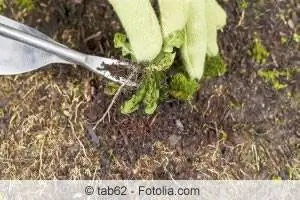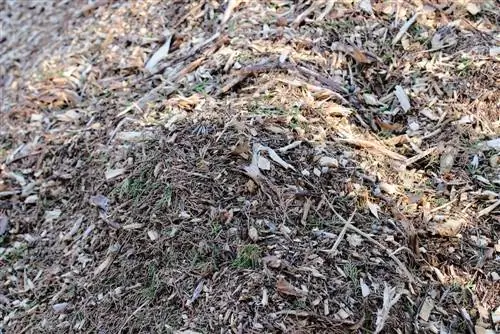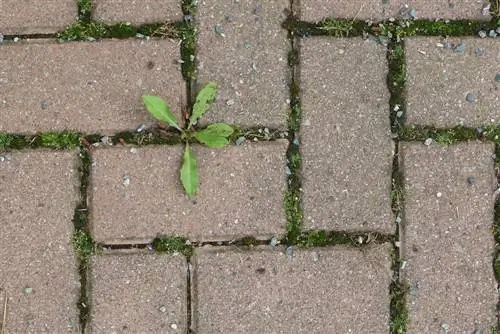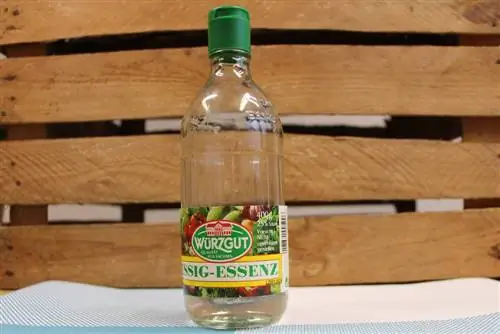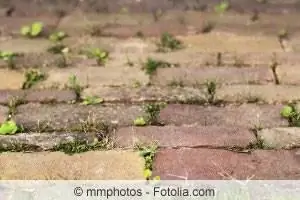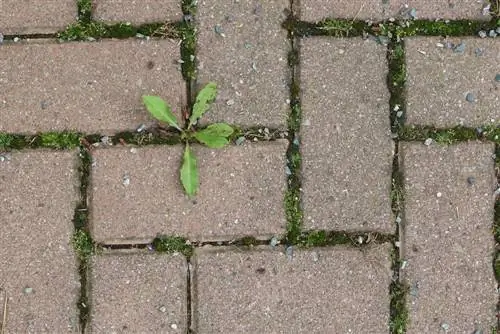- Author admin caroline@plants-knowledge.com.
- Public 2023-12-17 03:39.
- Last modified 2025-06-01 06:48.
When carefully tended flowers become overgrown with weeds, some gardeners want a simple solution. Unfortunately, neither the vinegar bottle nor the s alt shaker offers this, but rather damages the garden soil in a forbidden way and makes any imbalance in the garden (which causes weeds to sprout excessively) at best worse in the long run. Find out how vinegar and s alt affect plants and how you can take more effective action against unwanted growth.
Do vinegar and s alt help against weeds?
Vinegar and s alt can destroy plants, in high enough concentrations they can kill almost any living being, this is how it works:
This is how vinegar affects plants
- Every organism only functions in the long term if its acid-base balance is in balance
- You can kill a person if you lower the blood pH by 0.33 pH measurement units (from the average normal value of 7.33 to 7.0)
- Half of a rat population will die if you consume 3310 mg (=3.31 g) of anhydrous acetic acid per kilogram of body weight
- Since a rat weighs only 300 g on average, 1.1 g is sufficient as a medium lethal dose (which a rat will never consume)
- The numbers show very well that vinegar is not always necessarily harmless to organisms
- Humans and rats, as more highly developed creatures, are equipped with highly intelligent buffer systems
- The plants are not available to the same extent
- Vinegar causes weeds to die when it is absorbed into the leaf veins with the water
- It penetrates the plant's cell membranes and damages them
- Almost all plants can only survive in the long term in soil with pH values between 5 and 7
- And are watered with water whose pH value is around 7
- Vinegar has a pH value of 2.5, so it can completely disrupt the acid-base balance of the plant
- A little vinegar in the water isn't enough, it just softens the water a little
- The concentrations of acetic acid that kill plants have significant potential for further damage
- The PH value in the soil drops, which damages the fine roots of all plants in the area
- They cannot absorb nutrients or water in sufficient quantities and can simply dry out
How s alt affects plants
Live plants can also be transformed into dead plants with s alt, in principle by a kind of drying out:
- The semi-permeable plant cells absorb s alt solution just like irrigation water
- Cells are always concerned with balance; substances in the cell should be present in the same concentration as in the environment
- When there is s alt solution floating around it, the cell wants to increase the s alt content to create a balanced state
- Salinity is increased by/in cells by expelling water
- The plant cells basically dry themselves out when they are watered with s alt solution
- End result: The cells shrink and the plant dies
Is the use of vinegar and s alt allowed?
Using vinegar as a weed killer is not always permitted everywhere:
- Some organic acids are approved as pesticides
- Five plant protection products currently approved for home and allotment gardens contain acetic acid as the active ingredient
- They are approved for use outdoors against annual monocotyledonous and dicotyledonous weeds
- But only on paths/places with woody plants, for pome fruit, stone fruit, ornamental trees, as individual plant treatment from the 2nd year onwards
- And only 2 x per growing season and year, at intervals of 7-14 days, no more than 100 ml/m²
- Also on lawn moss, 2 x per year at least 40 days apart, as a partial area treatment, max. 100 ml in 2 l of water/m²
This only applies to commercially available weed killers with acetic acid, which contain the acid in an active ingredient content of 102 g/l. Apart from the application restrictions just listed, when you purchase these products you will also receive a few hazard warnings and safety instructions: “To avoid risks to people and the environment, follow the instructions for use.”, “Causes skin irritation.”, “Causes serious eye irritation.“; “Do not allow the product and/or its container to enter waterways.”
There are also a number of application regulations and requirements, e.g. E.g.:
- SB001: Avoid any unnecessary contact with the product. Misuse can lead to damage to he alth.
- SB110: The guidelines for the requirements for personal protective equipment in crop protection “Personal protective equipment when handling crop protection products” from the Federal Office of Consumer Protection and Food Safety must be observed.
- SE1201: Wear tightly fitting safety goggles when applying/handling.
- SF245-01: Only enter treated areas/crops again after the spray coating has dried.
- SS1201: Wear universal protective gloves (plant protection) when applying/handling.
- SS2203: Wear protective suit against pesticides when applying/handling.
- SS703: Wear sturdy shoes (e.g. rubber boots) when spreading/handling.
If you mix it yourself, even in the legally required quantities (which won't be so easy because you would first have to find out whether acetic acid is sold in the store in the same concentration within the meaning of the Plant Protection Act), you are still using a pesticide within the meaning of the law, but a banned plant protection product. Because your own mixture has not been tested by the state, so using it will result in a fine. If you use this vinegar somewhere outside of garden areas (or not sufficiently restricted in the garden), i.e. there is a chance that the vinegar will end up on public land or in the water, you are committing an environmental crime, § 324 StGB water pollution, § 324a StGB soil contamination Example, in case of doubt, a prison sentence will result. It's exactly the same with s alt, in the form of our table s alt sodium chloride (the sodium s alt of hydrochloric acid) - our environmental criminal law was created precisely to prevent people from using dangerous chemical substances like s alt (or hydrochloric acid or arsenic or whatever a poison) in the area. S alt (like hydrochloric acid or arsenic or whatever poison) is not approved at all as a pesticide. Obviously there are more suitable substances; the s alt that we are allowed to release into the environment is used as road s alt to make dangerously slippery roads safe for citizens to drive on. Unless exceptions are expressly provided for by a municipal ordinance, this road s alt may only be applied by government bodies and not by private individuals.
What vinegar and s alt do to the garden
All of these regulations do not exist out of official control madness, but rather to protect citizens from irresponsible fellow citizens, and with s alt and vinegar for good reason: s alt in the soil endangers the groundwater, changes the pH value and soil structure, even to the point of compaction and siltation, and the plant life in the area may also be deprived of its livelihood. In most areas of Germany, road s alt is now only spread when there is a particularly high risk of black ice. Because we now know that it causes massive damage to trees and bushes (main problem: root damage), pollutes soils and groundwater, causes sore paws in animals, and attacks shoes, clothing and concrete. Neither of them differentiates between whether they are used against weeds or your favorite rose - and vinegar is not necessarily more harmless, especially for the garden, as mold still grows at a pH value of less than 2, so you could infect your entire garden with the use of vinegar. Before you even think about spilling vinegar and s alt in the garden, here are a few thoughts and information about weeds in the garden:
The weeds in the garden are done by the gardener
1. How much unplanned vegetation develops in a garden is up to the gardener
A garden is a piece of nature in which plants develop. Plants are living beings that, like all living things, want to reproduce. But the garden is a piece of nature designed by man, and this man, the gardener, also has control over the extent and extent to which the plants in his garden reproduce. In the truest sense of the word in the hand, because traditional gardening is manual work. For example, weeding has traditionally and effectively prevented foreign vegetation from developing excessively or at all for a very long time. If a little mental work is added, information about the traditions of good professional practice in the gardening trade that have grown over centuries of experience (which our new Plant Protection Act of February 2012 also prescribes in Section 3 for the implementation of plant protection measures), a naturally overgrown garden is created, which is in ecological balance.
In which undesirable growth is hindered in development by natural means:
- By filling the garden with robust plants that are sufficiently adapted to the location
- Which are competitive enough not to be disturbed in development by every seed flown in from somewhere
- In which the garden soil is not weakened by repeated planting of monocultures
- But is strengthened by maintaining a suitable crop rotation or sequence of decorative plants
- And is maintained by spreading compost, green manure, deep-rooted area planting
- In which there are absolutely no bare and bare areas of earth on which unplanned vegetation can develop unhindered
- There is no bare earth openly exposed to the elements anywhere in nature (except in the desert)
- On areas covered with ground cover or a layer of mulch, perhaps a single foreign plant will develop, but certainly not a mass weed growth
2. You decide for yourself what “weed” is
A herb is a herb, simply a plant that does not become woody; When you look closely, the definition of the “un” herb is quite strange: a plant becomes a weed - a plant worth destroying, which is not infrequently destroyed by poisonous substances being spread on its place of growth - when a person calls it a weed.
Conclusion
Vinegar and s alt are not suitable for killing weeds in the garden, and they are certainly not allowed. However, you are allowed to decide for yourself which plant is a weed for you - if you do not follow the definition of profit-oriented soil exploiters, the weeds in the naturally managed garden can be reduced to almost zero with a few tricks.

